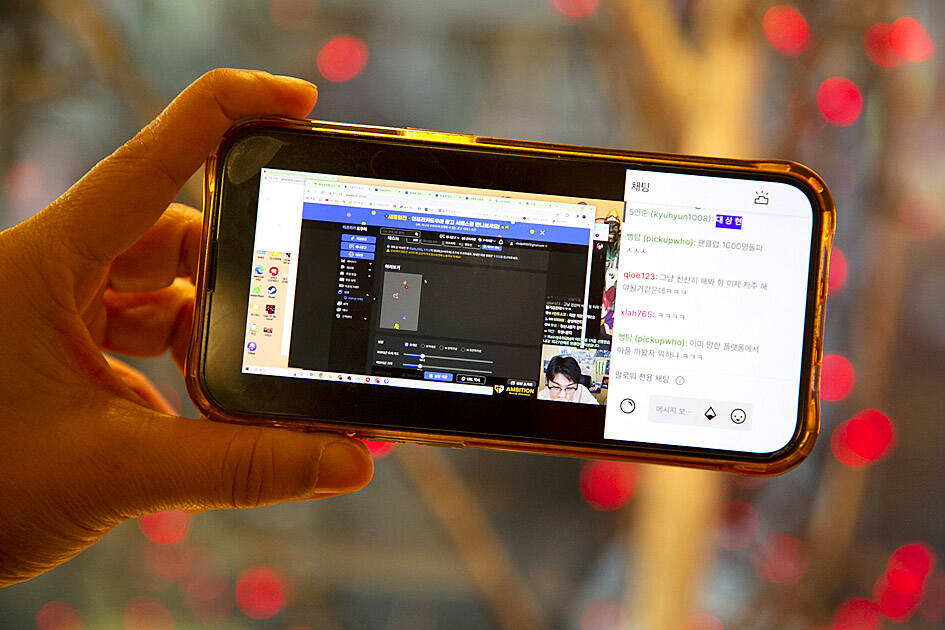Amazon.com Inc’s livestreaming site Twitch launched its own short-form video platform, a week after Washington passed a law that threatens the future of the social-media service TikTok in the US.
Creators on Twitch typically livestream themselves playing video games or chatting with audiences, sometimes for up to eight hours at a time.
The new service, called Discovery Feed, allows viewers to scroll through short clips taken from those longer videos. It appears as a new tab on Twitch’s mobile app.

Photo: EPA-EFE
Discovery Feed has a way to go before becoming a significant rival to TikTok. Early posts viewed by Bloomberg included an Arizona State University professor welcoming students to class and a streamer getting attacked on the street.
Unlike TikTok, Twitch creators generally do not upload their own short-form content. Instead users pick out funny or entertaining segments from creators’ livestreams and turn them into clips.
The Discovery Feed will be “personalized based on a viewer’s watch history and real-time interactions,” a Twitch spokesperson said.
Streamers will not receive a cut of the advertising revenue that appears on Discovery Feed because the commercials appear between their clips and not directly in them, the spokesperson said.
TikTok is a division of China’s ByteDance Ltd (字節跳動).
The US Congress and US President Joe Biden’s administration are forcing ByteDance to divest the service or face a ban out of concern that China’s government could use the app for propaganda or spying on US residents.
The app has 170 million monthly users in the US.
A majority of Americans believe that China uses TikTok to shape US public opinion, a Reuters/Ipsos poll of 1,022 US adults nationwide showed.
Fifty-eight percent of respondents to the two-day poll, which was conducted online and closed on Tuesday, agreed with a statement that the Chinese government uses TikTok to “influence American public opinion.”
The survey showed that 13 percent disagreed, while the rest were unsure or did not answer the question.
Republicans were more likely than Democrats to see China as using the app to affect opinions in the US, the poll found.
The Reuters/Ipsos poll found that 50 percent of respondents supported banning TikTok, while 32 percent opposed a ban and the rest were unsure.
The poll only surveyed US adults and does not reflect the views of people under the age of 18, who make up a significant portion of TikTok's users in the US.
About six in 10 respondents aged 40 or older supported a ban, compared with about four in 10 aged 18 to 39.
The poll also showed that 46 percent agreed with a statement that China is using the app to "spy on everyday Americas," an allegation Beijing has denied.

Application-specific integrated circuit designer Faraday Technology Corp (智原) yesterday said that although revenue this quarter would decline 30 percent from last quarter, it retained its full-year forecast of revenue growth of 100 percent. The company attributed the quarterly drop to a slowdown in customers’ production of chips using Faraday’s advanced packaging technology. The company is still confident about its revenue growth this year, given its strong “design-win” — or the projects it won to help customers design their chips, Faraday president Steve Wang (王國雍) told an online earnings conference. “The design-win this year is better than we expected. We believe we will win

Intel Corp chief executive officer Lip-Bu Tan (陳立武) is expected to meet with Taiwanese suppliers next month in conjunction with the opening of the Computex Taipei trade show, supply chain sources said on Monday. The visit, the first for Tan to Taiwan since assuming his new post last month, would be aimed at enhancing Intel’s ties with suppliers in Taiwan as he attempts to help turn around the struggling US chipmaker, the sources said. Tan is to hold a banquet to celebrate Intel’s 40-year presence in Taiwan before Computex opens on May 20 and invite dozens of Taiwanese suppliers to exchange views

Chizuko Kimura has become the first female sushi chef in the world to win a Michelin star, fulfilling a promise she made to her dying husband to continue his legacy. The 54-year-old Japanese chef regained the Michelin star her late husband, Shunei Kimura, won three years ago for their Sushi Shunei restaurant in Paris. For Shunei Kimura, the star was a dream come true. However, the joy was short-lived. He died from cancer just three months later in June 2022. He was 65. The following year, the restaurant in the heart of Montmartre lost its star rating. Chizuko Kimura insisted that the new star is still down

While China’s leaders use their economic and political might to fight US President Donald Trump’s trade war “to the end,” its army of social media soldiers are embarking on a more humorous campaign online. Trump’s tariff blitz has seen Washington and Beijing impose eye-watering duties on imports from the other, fanning a standoff between the economic superpowers that has sparked global recession fears and sent markets into a tailspin. Trump says his policy is a response to years of being “ripped off” by other countries and aims to bring manufacturing to the US, forcing companies to employ US workers. However, China’s online warriors